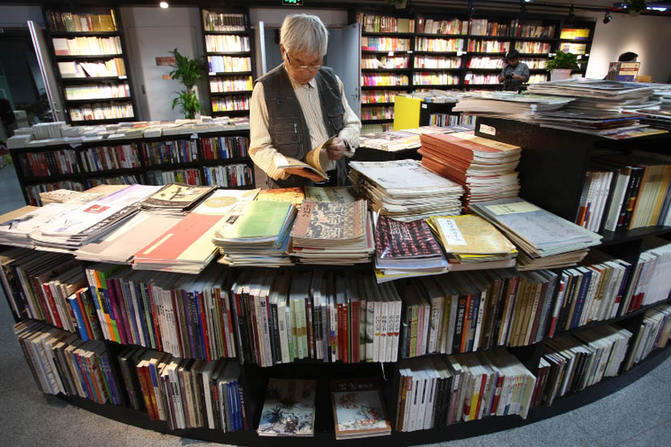Reading, Back in Vogue
A reader browses at the Jifeng Bookstore in Shanghai.

The Return of Belles-lettres
The reading tastes of Chinese people are evolving. Formerly, the bestsellers would be mostly instructional and advice books that people turn to for solutions to the problems they encounter in life. They are now the more artistic and imaginative works of literature. The 2013 figures for Dangdang.com, the world’s largest Chinese online bookstore, show that sales of new books on literature and art including fiction and youth dramas rose by one third over the previous year.
As Dangdang dominates almost half the online book sales in China, its figures are a reliable indicator of the general reading habits of Chinese people. In 2009, its top sellers were The Wisdom to Protect Yourself from Illness and A Good Kid Outplays a Good Teacher. The titles tell it all: both provide supposed solutions to meet practical needs. On Dangdang’s 2013 bestseller list, the four highest slots went to: The Shadow Thief (Le Voleur d’Ombres) by Marc Levy of France; See, a autobiography by former CCTV host Chai Jing; The Wind Shearing Clouds, a collection of essays by post-1980s star writer Guo Jingming; and Thank You for Leaving Me, essays on love by Hong Kong’s Amy Cheung Siu Han. All fall into the genre of soul-searching or thought-provoking books. Zhu Xiaofan, an editor of a Beijing-based publishing house, indicated that the 2013 bestseller by her publishing house is So Young, a youth novel, also belonging to this genre. Ms Zhu, in her early 30s, has a penchant herself for youth stories and fiction, particularly detective stories.
See – a reflection on the decade Chai Jing spent hosting CCTV investigative programs – sold out in many stores during its debut at the end of 2012, and has remained popular to date. It relates, from an insider’s perspective and in an intimate tone, some of the most significant events in China over that period, including the SARS outbreak, the Wenchuan earthquake, and the Beijing Olympic Games. Such subjects can easily grab reader attention. Moreover, the broad fan base of the witty attractive young host also plays a role in its strong sales. Another highlight of China’s 2013 book market is that many of the bestsellers were titles released that year, breaking away from older trends.
E-books on the Rise
It is now an omnipresent sight on public transport – people hunched over their mobile phones or other electronic gadgets, browsing news or perusing stories.
Zhu Xiaofan takes out an e-reader to catch a few lines while waiting for the bus, so as she explains, to “make the best of my time.” She also has a habit of reading an e-book in bed before falling asleep. “It offers some relaxation,” she says.
The 10th national survey of reading activities found that Chinese people read on average 2.35 e-books in 2012 – a 65.5 percent jump over 2011. Digital reading also found its way to 40.3 percent of the Chinese population, rising 1.7 percent from 2011.
Chi Yukai, head of the Human Resources Management and Psychological Evaluation Department of South China Normal University, observes, with more avenues to obtain information, fewer people today opt to study in depth through printed books. In many homes, computers are replacing bookshelves, and this explains the widespread closure of mortar-and-brick bookstores throughout much of the world.
Many have expressed concern that printed books could die out one day. Zhang Yiwu, a famed commentator and Peking University professor, is one of those who disagree: “However rapidly e-reading may develop, printed books are here to stay, just as calligraphy has survived unscathed through the age of keyboard input.”
According to the 10th national survey of reading activities, over 90 percent of the Chinese people who ever read on screens are 49 years old or below. Overall, the printed book is the mainstay reading material for more than 70 percent of the Chinese population.
Zhang Ming, who works for a state-owned company, prefers printed books for their texture, which he claims possesses a calming magic. “If you are lucky enough to find decades-old publications, the aura of time and history is even stronger,” he says. Also, he often becomes captivated by a book during a casual skim through a bookstand at an airport, where only print publications are available.
